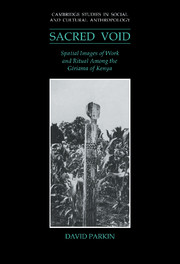Book contents
- Frontmatter
- Contents
- List of illustrations
- Preface
- Introduction
- 1 Fantasies of the west
- 2 Western Kaya, sacred centre
- 3 View from the west: cattle and co-operation
- 4 From west to east: the works of marriage
- 5 Spanning west and east: dances of death
- 6 Alternative authorities: incest and fertility
- 7 Alternative selves: invasions and cures
- 8 Coastal desires and the person as centre
- Conclusion
- Appendix 1 Three ecological zones and demographic features of southern Kilifi District
- Appendix 2 Giriama kinship and affinal terms
- Appendix 3 Giriama cattle terms
- Appendix 4 Giriama patri-clan structure
- Bibliography
- Index
- Cambridge Studies in Social and Cultural Anthropology
Appendix 2 - Giriama kinship and affinal terms
Published online by Cambridge University Press: 03 November 2009
- Frontmatter
- Contents
- List of illustrations
- Preface
- Introduction
- 1 Fantasies of the west
- 2 Western Kaya, sacred centre
- 3 View from the west: cattle and co-operation
- 4 From west to east: the works of marriage
- 5 Spanning west and east: dances of death
- 6 Alternative authorities: incest and fertility
- 7 Alternative selves: invasions and cures
- 8 Coastal desires and the person as centre
- Conclusion
- Appendix 1 Three ecological zones and demographic features of southern Kilifi District
- Appendix 2 Giriama kinship and affinal terms
- Appendix 3 Giriama cattle terms
- Appendix 4 Giriama patri-clan structure
- Bibliography
- Index
- Cambridge Studies in Social and Cultural Anthropology
Summary
As is evident from the two sets of kinship and affinal relationship terms given below, the Giriama system is broadly of the so-called ‘Hawaiian’ type, and has two main characteristics. First, siblings, parallel cousins and cross cousins may all be referred to by the same term. Second, there is bifurcate merging in the immediately ascending generation, such that a father and father's brother are called by the same name, but not the mother's brother; and that a mother and mother's sister are called by the same name, but not the father's sister. Marriage may occur with all cousins except a patrilateral parallel cousin, and into all clans except the patri-clan (see Appendix 4).
The links between generational differentiation and relationships of respect and joking are dealt with in the main text of chapter four. Broadly speaking, members of alternate generations joke, while those of adjacent ones respect each other. This is reinforced by the reciprocal use of singular and plural pronominal forms of address respectively. But there are a few complicating factors that may intervene, as is the case with the use of kinship terms. Terms of address between alternate generations are reciprocated by members of the same sex or are reciprocally equivalent between members of different sex.
- Type
- Chapter
- Information
- The Sacred VoidSpatial Images of Work and Ritual among the Giriama of Kenya, pp. 236 - 238Publisher: Cambridge University PressPrint publication year: 1991



